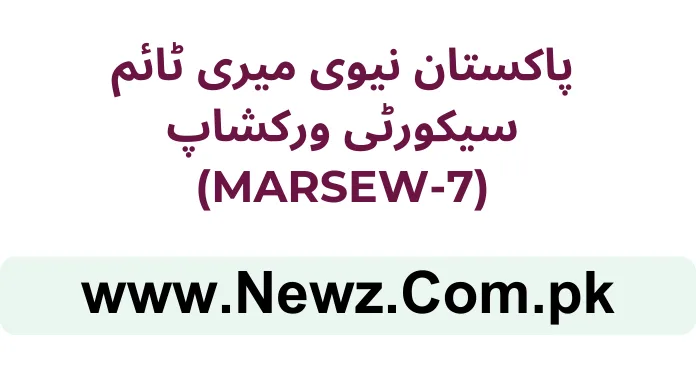Promoting Maritime Security: Insights from the MARSEW-7 Workshop
The Pakistan Navy, a cornerstone of the nation’s maritime defense, recently organized the seventh iteration of the Maritime Security Workshop (MARSEW-7). Held at the Pakistan Navy War College, Lahore, from November 26 to December 5, 2024, this workshop served as a platform for thought leaders, security experts, and policymakers to discuss the importance of maritime security in Pakistan.
With the theme “Safe Seas—Prosperous Pakistan,” MARSEW-7 highlights the critical role of maritime security in bolstering Pakistan’s economic prosperity and safeguarding its maritime frontiers.
The Significance of MARSEW
Launched in 2017, MARSEW has evolved into an essential forum for promoting awareness about the maritime domain’s challenges and opportunities. The workshop underscores the pivotal role of the oceans in ensuring national security, economic development, and regional stability.
This year, MARSEW-7 focused on fostering collaborative strategies to strengthen Pakistan’s maritime defense infrastructure while emphasizing the economic potential of a secure maritime environment.
Key Objectives of MARSEW-7
The workshop aimed to:
- Raise Awareness: Highlight the critical importance of maritime security for Pakistan’s economic and strategic interests.
- Address Challenges: Delve into the multifaceted threats to maritime safety, including piracy, illegal fishing, and environmental hazards.
- Foster Collaboration: Encourage synergy between government institutions, security forces, and private stakeholders to ensure maritime stability.
- Enhance Capabilities: Advocate for the modernization of Pakistan’s maritime infrastructure, including ports, shipping lanes, and naval defense systems.
Chief of Naval Staff’s Message
Admiral Naveed Ashraf, Chief of Naval Staff, emphasized the need for a robust maritime strategy. He highlighted the Pakistan Navy’s proactive measures in countering maritime threats and ensuring the security of the nation’s Exclusive Economic Zone (EEZ).
Admiral Ashraf reiterated the economic significance of maritime trade routes, which form the backbone of Pakistan’s economy. He urged stakeholders to prioritize maritime development projects, such as the China-Pakistan Economic Corridor (CPEC) and Gwadar Port, to unlock the country’s economic potential.
Maritime Security: A Cornerstone for Prosperity
Pakistan’s coastline stretches over 1,000 kilometers, and its maritime domain plays a crucial role in global trade. The country’s dependence on the sea for commerce and resources necessitates a secure maritime environment.
Economic Impact
A secure maritime environment is essential for facilitating trade, ensuring energy supplies, and promoting economic growth. Ports like Karachi, Port Qasim, and Gwadar are vital for handling Pakistan’s imports and exports.
Strategic Importance
The Arabian Sea is a critical maritime region for global energy transport and trade. By ensuring security in this region, Pakistan contributes to regional stability and strengthens its strategic position on the world stage.
Challenges to Maritime Security
Despite its strategic importance, Pakistan faces numerous challenges in maintaining maritime security:
- Piracy and Illegal Activities: These include smuggling, illegal fishing, and drug trafficking, which threaten regional stability.
- Environmental Concerns: Pollution, overfishing, and climate change adversely impact marine ecosystems and coastal communities.
- Geopolitical Tensions: Rivalries in the Indian Ocean Region (IOR) pose additional threats to Pakistan’s maritime security.
Pakistan Navy’s Role
The Pakistan Navy has consistently played a pivotal role in safeguarding the nation’s maritime interests. Through joint exercises, capacity building, and enhanced surveillance, it ensures the protection of Pakistan’s maritime domain.
Key Initiatives
- Participation in multinational naval exercises to strengthen regional cooperation.
- Deployment of advanced vessels and technologies to monitor and secure Pakistan’s EEZ.
- Collaboration with international organizations to combat illegal activities and enhance maritime governance.
Future Prospects
MARSEW-7 not only highlighted the challenges but also offered solutions for achieving maritime security. Recommendations included:
- Capacity Building: Investing in modern naval technologies and infrastructure.
- Policy Formulation: Developing comprehensive maritime policies to address emerging threats.
- Public Awareness: Promoting maritime literacy among policymakers, academia, and the general public.
Conclusion
The MARSEW-7 workshop reflects the Pakistan Navy’s unwavering commitment to ensuring a safe and prosperous maritime future. By addressing security challenges and exploring economic opportunities, the workshop paves the way for a resilient maritime strategy.
A secure maritime domain is not just about defense; it’s about unlocking economic potential, safeguarding resources, and contributing to global stability. As Admiral Naveed Ashraf aptly remarked, “A prosperous Pakistan begins with safe seas.”
This workshop serves as a beacon for fostering unity and collaboration in achieving a secure maritime environment—a vision crucial for Pakistan’s prosperity and regional leadership.






